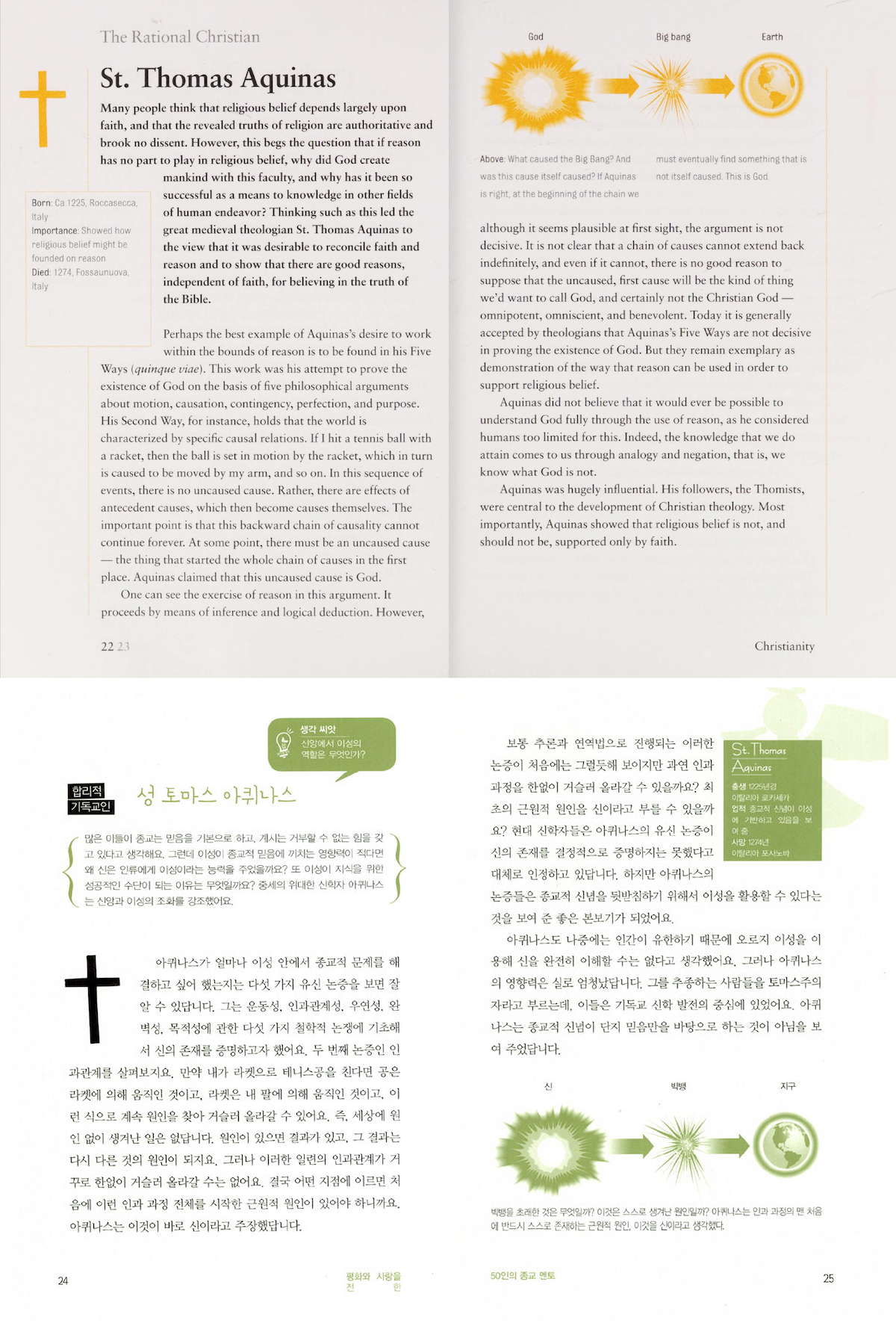Book Translation [English → Korean]
I solely translated “Little Book of Big Ideas: Religion” by Dr. Jeremy Strangroom from English to Korean language.
제레미 스탠그룸 박사의 “평화와 사랑을 전한 50 인의 종교 멘토” (도서출판 책숲)의 한국 발매를 위한 번역가로 계약을 맺고 영한 총괄 번역하였습니다.
The main objective of the book was to introduce world religions such as Christianity, Islam, Buddhism, Hinduism, Eastern Religions, etc. to audiences who are not familiar with the subject.
해당 서적은 종교라는 주제에 익숙하지 않은 독자를 대상으로 기독교, 이슬람, 불교, 힌두교, 동방 종교 등 세계 종교를 간단히 종합 소개하는 목적을 지니고 있습니다.
The following pages are excerpts from the original and the translated version. (Please note that the final Korean version is heavily edited due to the nature of the target audience.)
다음은 원서 및 번역본에서 발췌한 샘플 페이지입니다. (한글 번역 최종본의 경우 독자의 성향을 감안하여 많은 편집, 교정 과정을 거쳤음을 감안해주시기 바랍니다.)

Many people think that religious belief depends largely upon faith, and that the revealed truths of religion are authoritative and brook no dissent.
→ 많은 이들이 종교는 믿음을 기본으로 하고, 종교적 계시는 거부할 수 없는 힘을 갖고 있다고 생각해요.
However, this begs the question that if reason has no part to play in religious belief, why did God create mankind with this faculty, and why has it been so successful as a means to knowledge in other fields of human endeavor?
→ 그런데 이성이 종교적 믿음에 끼치는 영향력이 적다면 왜 신은 인류에게 이성이라는 능력을 주었을까요? 또 이성이 지식을 위한 성공적인 수단이 되는 이유는 무엇일까요?
Thinking such as this led the great medieval theologian St. Thomas Aquinas to the view that it was desirable to reconcile faith and reason and to show that there are good reasons, independent of faith, for believing in the truth of the Bible.
→ 중세의 위대한 신학자 토마스 아퀴나스는 이러한 생각 끝에 신앙과 이성은 조화를 이루어야 하고, 신앙과는 별개로 성서의 진리를 믿을 수 있는 합리적인 이유가 있다는 견해에 다다릅니다.
Perhaps the best example of Aquinas’s desire to work within the bounds of reason is to be found in his Five Ways (quinque viae).
→ 아퀴나스가 얼마나 이성의 범주 안에서 종교적 문제를 해결하고 싶어 했는지는 다섯 가지 유신 논증을 보면 잘 알 수 있답니다.
This work was his attempt to prove the existence of God on the basis of five philosophical arguments about motion, causation, contingency, perfection, and purpose.
→ 그는 운동성, 인과관계성, 우연성, 완벽성, 목적성에 관한 다섯 가지 철학적 논쟁에 기초해서 신의 존재를 증명하고자 했어요.
His Second Way, for instance, holds that the world is characterized by specific causal relations. If I hit a tennis ball with a racket, then the ball is set in motion by the racket, which in turn is caused to be moved by my arm, and so on.
→ 예를 들어 그는 두번째 논증에서 세상에는 분명한 인과관계가 있다고 여겼죠. 만약 내가 라켓으로 테니스 공을 친다면 공은 라켓에 의해 움직인 것이고, 라켓은 내 팔에 의해 움직인 것이고, 이런 식으로 계속 원인을 찾아 거슬러 올라갈 수 있어요.
In this sequence of events, there is no uncaused cause. Rather, there are effects of antecedent causes, which then become causes themselves.
→ 즉, 세상에 원인 없이 생겨난 일은 없답니다. 원인이 있으면 결과가 있고, 그 결과는 다시 다른 것의 원인이 되지요.
The important point is that this backward chain of causality cannot continue forever. At some point, there must be an uncaused cause—the thing that started the whole chain of causes in the first place. Aquinas claimed that this uncaused cause is God.
→ 그러나 이러한 일련의 인과관계가 거꾸로 한없이 거슬러 올라갈 수는 없어요. 결국 어떤 지점에 이르면 처음에 이런 인과 과정 전체를 시작한 근원적 원인이 있어야 하니까요. 아퀴나스는 바로 이 근원적 원인이 신이라고 주장했답니다.
One can see the exercise of reason in this argument. It proceeds by means of inference and logical deduction. However, although it seems plausible at first sight, the argument is not decisive.
→ 이런 일련의 과정에는 이성이 활용되었죠. 추론과 연역법을 통해 진행되었으니까요. 하지만 이러한 논증이 처음에는 그럴듯해 보이지만 결정적인 것은 아니예요.
It is not clear that a chain of causes cannot extend back indefinitely, and even if it cannot, there is no good reason to suppose that the uncaused, first cause will be the kind of thing we’d want to call God, and certainly not the Christian God—omnipotent, omniscient, and benevolent.
→ 인과 과정을 한없이 거슬러 올라갈 수 없는지도 확실치 않고, 무한하지 않더라도 그 근원적 원인을 우리가 신이라고 부를 수 있을까요? 특히 전지전능하고 자비로운 기독교의 신일 것이라는 보장은 더더욱 없죠.
Today it is generally accepted by theologians that Aquinas’s Five Ways are not decisive in proving the existence of God. But they remain exemplary as demonstration of the way that reason can be used in order to support religious belief.
→ 현대 신학자들은 아퀴나스의 유신 논증이 신의 존재를 결정적으로 증명하지는 못한다고 대체로 인정하고 있답니다. 하지만 아퀴나스의 논증들은 종교적 신념을 뒷받침하기 위해서 이성을 활용할 수 있다는 것을 보여준 좋은 본보기가 되었어요.
Aquinas did not believe that it would ever be possible to understand God fully through the use of reason, as he considered humans too limited for this. Indeed, the knowledge that we do attain comes to us through analogy and negation, that is, we know what God is not.
→ 아퀴나스는 인간이 너무나도 유한하기 때문에 오로지 이성을 통해 신을 완전히 이해할 수 있게 되는 날은 오지는 않을 것이라고 생각했답니다. 실제로 우리는 유추와 부정을 통해 지식을 습득하게 되는데, 이는 다시 말해 신이 무엇이 아닌지를 아는 것 뿐이에요.
Aquinas was hugely influential. His followers, the Thomists, were central to the development of Christian theology. Most importantly, Aquinas showed that religious belief is not, and should not be, supported only by faith.
→ 토마스 아퀴나스의 영향력은 실로 엄청났답니다. 그를 추종하는 사람들을 토마스주의자라고 부르는데, 이들은 기독교 신학 발전의 중심에 있었어요. 아퀴나스는 종교적 신념이 단지 믿음만을 바탕으로 하는 것이 아님을 보여주었답니다.

Post a comment